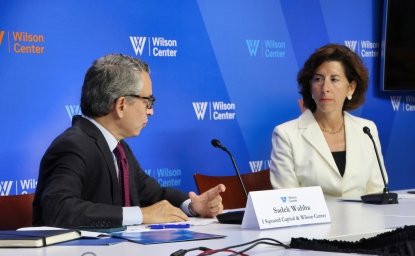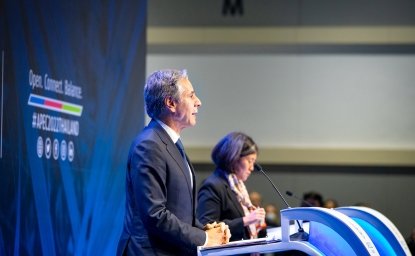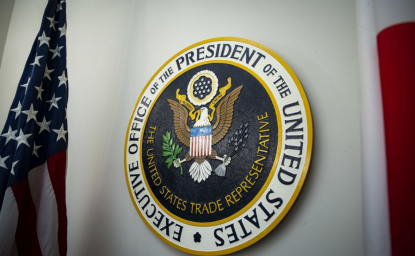Where did it all go so terribly, terribly wrong?
In the case of the Indo-Pacific Economic Framework trade pillar, the best answer would be from the very start.
Launched in 2022, IPEF is forum of 14 countries–including the US–that has committed to enhancing cooperation across four pillars: trade; supply chains; clean energy, decarbonization and infrastructure; and tax and anti-corruption. Governments from these countries have already agreed on a framework for communication and crisis response to supply chain bottlenecks. On the sidelines of the Asia Pacific Economic Cooperation meeting in San Francisco this week, IPEF members also struck deals on the clean energy and anti-corruption pillars.
Significantly, the lead US negotiator in these pillars has been the dynamic Commerce Secretary, Gina Raimondo. Secretary Raimondo also announced in San Francisco plans to facilitate private sector investment in the region through the IPEF Investment Forum. By contrast, the trade negotiations led by US Trade Representative Katharine Tai have languished from the start.
President Biden’s intentions in launching IPEF were sound. He knew the political climate in the US would not permit an ambitious trade agreement such as the Comprehensive and Progressive Trans-Pacific Partnership, which he supported as vice president. President Trump withdrew US participation in 2017. But Biden also knew that China was steamrolling through the region via various trade agreements. IPEF was an effort to counter Chinese influence by reinforcing the US presence in the region. While expectations on the trade front were never high among US IPEF partners, there was an appreciation of Washington’s renewed engagement in the region.
So far, so good. But in stating from the beginning that tariff cutting and market access more broadly were off the table, Washington ensured that the trade pillar would yield meager results at best. Rather than focus on “traditional” trade issues such as tariffs, the Office of the US Trade Representative thought it could use the trade pillar to impose its version of labor and environmental standards on other members. It was hardly an auspicious start when India, the third largest IPEF economy and no fan of trade opening, withdrew immediately from trade talks.
Anyone familiar with negotiations in the World Trade Organization will know how difficult the subjects of labor and environmental standards are for many developing countries. Indonesia, Malaysia, and Thailand have been among the most vocal opponents of including the issues in the WTO, even when the US and the European Union dangled the prospect of access to their lucrative markets and big reductions in their farm subsidies. Somehow, Ambassador Tai was under the impression that these countries–all members of IPEF–could be induced to accept labor and environment provisions in the forum in exchange for, well, nothing. It was on these issues, and on how to enforce them, that the trade talks foundered. Small wonder.
Another reason for the Biden administration’s “trade-lite” IPEF approach is that they wanted to avoid bringing any agreement that may emerge to Congress for ratification. Absent tariff cuts, the thinking went, the deal could be approved as an executive order rather than though implementing legislation, as with traditional trade agreements.
This tack, and the rather secretive nature of Ambassador Tai’s approach rankled Democrats on Capitol Hill. Powerful senators, including Majority Leader Chuck Schumer of New York, Finance Committee Chair Ron Wyden of Oregon, and Banking Committee Chair Sherrod Brown of Ohio urged the White House to pull the plug and the plug was duly pulled.
“I’ve made it very clear that the trade portion of the Indo-Pacific Economic Framework is unacceptable, and I’m glad it’s not moving forward,” Sen. Brown noted in a press release.
As reasons for his opposition, he cited the lack of enforceable labor standards, a negotiating process that lacked transparency, and the possibility that China might circumvent US trade measures by transshipping through IPEF members.
The collapse of the IPEF talks marks the second time in less than month that the Biden administration has failed to reach agreement with close allies on trade. Last month, the US was on the cusp of an agreement with the EU that would have promoted clean manufacturing of steel and aluminum while curbing imports of unfairly traded steel–largely those products coming from China. The talks were also slated to produce an agreement that would have strengthened cooperation between Brussels and Washington on electric vehicle production. Those talks broke down spectacularly when Washington insisted its inspectors be given the right to verify that suppliers to EU automakers met US labor and environmental standards. The Americans also insisted US steel producers be exempt from the EU’s carbon emissions control mechanism.
“The EU has always said these were unacceptable conditions, but Washington insisted. It was a disaster,” said one senior EU business leader.
European and Asian leaders see little hope that any of these talks can be resuscitated in 2024, when elections will be held in the US, EU, and Indonesia.
It is disquieting that Democrats can be so rattled by IPEF trade discussions that were, by design, structured to yield little or no substance. So is the opposition to striking steel and environmental deals with the EU. But the alarm over the president’s polling numbers and the possibility of a second Trump presidency have driven the Biden administration into a self-protective shell, from which anything resembling international economic cooperation–even with allies–is viewed with great trepidation. Expect these talks to be sidelined for some time to come.
Author

Director of the Information and External Relations Division and Chief Spokesman at the World Trade Organization (retired)

Wahba Institute for Strategic Competition
The Wahba Institute for Strategic Competition works to shape conversations and inspire meaningful action to strengthen technology, trade, infrastructure, and energy as part of American economic and global leadership that benefits the nation and the world. Read more







